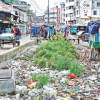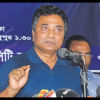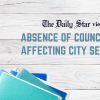A campaign for litter-free Bangladesh
Once a lush pasture of greenery, the landscape of Bangladesh is now on the verge of becoming a spectre of polythene littered waste ground. Take the instance of any locality of Bangladesh, be it a tourist area or an ordinary rural or urban zone, pervasive littering is the norm. The roadsides, the high and low grounds by the canals, the open space, the drains in the city, your neighbourhood; it is all the same - polythene, plastics and packaging litters cluttering the surface. Would any discerning visitor planning a business or holiday trip to Bangladesh in his or her right mind want to be steeped in a vast waste ground dotted with litter everywhere? And what does it indicate about our national mindset? Bangladesh has the highest number of polluters per square kilometre than any other country in the world. Those who have lived or grown up in the midst of a littered environment may take it as an element of everyday life without being disturbed, but unbridled littering is setting the country's landscape on a path to become a mega dumpster, and turning the country into a wasteland.
Be it the picturesque shore of Jamuna in Sariakandi, the roadside by the grand resort in Srimangal, the various train stations of the country, unrestrained littering ruin the serenity of the area. The deluge of plastics, polythene and papers in the beach town, Cox's Bazar, its malls and roadsides by the beach, the heap of polythene and waste that surrounds the decrepit pier where tourists and locals board for Moheshkhali, all create an unhealthy and uninviting ambience, and cannot be the signs of a tourist zone that wants to attract international tourists. In Dhaka, the area alongside the Dhaka City Corporation's (DCC) head office is also heavily littered and indicates the inability of the DCC to tackle this crisis.
The danger posed by such 'spontaneous' littering not only damages our natural habitat and ecosystem, it also depicts an ugly side of our Bangladeshi identity. It is an antithesis to our achievements as a hardworking nation, which aspires to be a model of development.
The lessons from Singapore, the fabled island nation that transformed itself from impoverishment to prosperity in a few decades, could guide us, even though the country is too small and unique as an example. Aside from its founding leadership's vision of a Singaporean identity that calls for "rugged individualism with emphasis on excellence", one of the first national campaigns of Singapore as an independent nation was the "Keep Singapore Clean" campaign. Launched on October 1, 1968 by Prime Minister Lee Kuan Yew, the month-long campaign aimed to make Singapore the cleanest and greenest city in the region by addressing the problem of inconsiderate littering. The government believed, according to authors Joshua Chia Yeong Jia and Lim Tin Seng, that improved environmental conditions would not only enhance the quality of life for Singaporeans and cultivate national pride, but also attract foreign investors and tourists to Singapore. Singapore today is one of the cleanest, most beautiful and prosperous countries that attract tourists and investors from all over the world. It has also become a more compassionate and inclusive society than in the past, and continued the legacy of building a clean and beautiful country through active public and private participation.
A national campaign for litter-free Bangladesh will be a timely call and a befitting tribute to the honour of 'Champion of the Earth' bestowed upon Prime Minister Sheikh Hasina recently, as well as the people of Bangladesh.
The success of the campaign will depend on the government's ability to engage civic and local leaders, opinion makers, local governments, students and the public. It will be an opportunity to ignite the positive energy of the youth to demand a cleaner and beautiful Bangladesh, and initiate a behavioural change towards the way we live and manage our environment. The clogged canals, polythene piles on high and low grounds, plastic bottles in public places such as train stations, recreational spots, tourist zones, and roads and pavements need to be clean.
While many Bangladeshis recognise the environmental menace of littering, a national wake-up campaign, actively championed by the national leadership, would be far more effective than the occasional focus on the issue by the media. It should be a regular year long activity and a continuous programme. The strategy should aim to contain inconsiderate littering through prevention and clean-up campaigns. This may create a momentum for initiating visible changes on the ground.
Business houses can donate and actively participate in the cleaning activity. The general public, shopkeepers and traders who generate waste should be given guidance on how to manage and dispose of waste. Non-biodegradable collectibles should be taken off the grounds, from roadsides, low and high lands, canals, marshes and rail tracks, and recycled. Children should be taught and encouraged to take ownership of the environment as an inalienable part of their livelihood. They should be urged to take action and encouraged to change social behaviour. School students could be involved in campaigns of cleaning up their schools, while colleges and universities can also participate in the litter free campaign to introduce behavioural change.
Educational campaigns, enactment and enforcement of anti-littering laws may contribute to long-term behavioural change. A culture must gradually emerge that instils environmental consciousness and values, and induces people to stay away from littering. This would require intervention in educational curriculums at school level, as well as active eengagement of social and political leaders. Individuals must understand that if you pack something in, you must pack that out, meaning no leftover trace should remain in an open, public space.
Improved and modern technological solutions, such as geographic information systems for environmental mapping and waste management, can act as effective tools for the relevant agencies, which will be part of the campaign. The campaign should be part of the environment management programmes within an Ecologically Sustainable Development Strategy (ESDS), involving local governments, community and religious leaders, business houses, shopkeepers, NGOs, media and political parties across the board. Ecologically sustainable development would require an effective regulatory framework within which waste could be effectively managed to minimise or avoid adverse impacts on the environment, while still allowing for economic development and improved quality of life for Bangladeshis. It will involve public and private costs, but the benefits will include protecting environmental values, health and safety, efficient use of resources, and avoidance of cleanup costs. The regulatory framework can also initiate a waste management industry for waste recycling and collection, thereby leading to associated industries involving mandatory trash bags and bins, and waste to energy projects, if viable, with active private and public sponsorship.
The cost of community inaction leads to an environmental disaster that affects all members of a society. We must prevent irreversible environmental damage and protect environmental productivity for future generations. The importance of a clean environment and resulting benefits on the mind, health and economy must be recognised by the public as well as by all levels of leadership. The sooner this is done, the better it is for our country.
The writer is an economist and Deputy Registrar at the Shanto-Mariam University of Creative Technology.

 For all latest news, follow The Daily Star's Google News channel.
For all latest news, follow The Daily Star's Google News channel. 








Comments